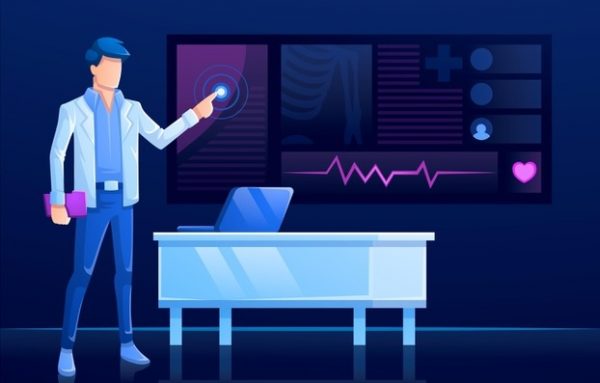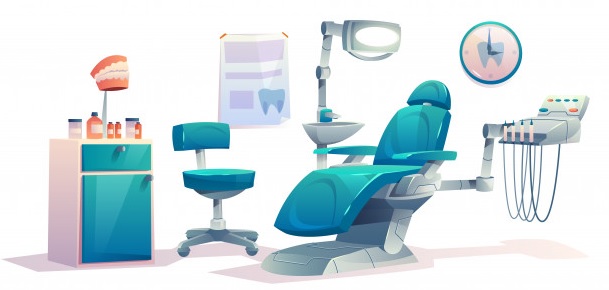
In today’s tech driven world, there will be hardly any tech savvy who hasn’t heard about virtual reality. With the growing dependency on technology, all the things are digitizing at a faster pace, and in such a scenario, many new technologies are actively adopted by the industries. Virtual reality, or VR is one such technology that has gained immense popularity in recent times.

We can witness the application of virtual reality in almost all the sectors of the global market today, be it education, retail, or even real estate. Healthcare sector is no exception. VR in medicine has been a growing trend since past some time now and many experts predict that it is the new beginning of the smart healthcare sector. Virtual reality in healthcare has completely transformed the offline healthcare services by making the impossible possible.
Whether in pain management, medical training, disease forecasting or even in diagnostics, VR in medicine has proved to be a great boon for the healthcare industry. So, if you are also related to the healthcare sector, or wanted to know how virtual reality is transforming the healthcare industry, then this article is for you!
In today’s article, we will share the eight most incredible uses of VR in medicine. Read on to know more!
1. Virtual Reality in Medical Education
Virtual reality in medical education has made it seamless for the students to learn new techniques related to the healthcare sector. With virtual reality, the medical students no longer need to dissect the actual human bodies for their theoretical and practical purposes. VR in medicine offers the future healthcare providers to enhance their skills and subject knowledge by providing them a virtual journey across the human body.
The students can learn new things, and can learn from other’s mistakes without risking the real patient’s life. Additionally, VR in medicine even enables the students to efficiently interact with all the equipment and procedures by offering them a complete virtual environment with 3D models and virtual operation videos.
2. Surgical Training

With the ongoing digitization of the healthcare sector, one thing that still needs to change is the surgical training. Meaning, even today, the future surgeons are trained and assessed in an old-fashioned way – books, practicals, pen and paper exams, etc.
Seeing that, many virtual enthusiasts raised a concern over the traditional methods and suggested the use of virtual reality in surgical training. In fact, many new innovators today are offering dedicated virtual training portals that create a virtual operating room for the surgeons to practice and learn complicated surgeries.
Additionally, there are many other virtual games that even allow emergency room physicians, anesthesiologists, and critical care specialists to learn about new techniques and special cases while playing games.
3. Educating Patients
Lack of knowledge about the disease, and treatments, and long queues for doctor’s consultation are the two most critical aspects of the healthcare industry. But, with an effective technology like VR, things are improving significantly.
VR in medicine is helping the patients to understand their health issues and their treatment in an effective way. It is bridging the gap between the patients and doctors by educating the patients on various critical aspects. Virtual environment, 3D models, and engaging videos are some of the ways through which virtual reality is educating the patients, and enhancing the healthcare services.
4. Pain Management
It is not a surprise that our subconscious mind is the best way that can help us to forget about the problems present in our surroundings. However, we still do not have access to such tools that can help us in doing so.
Virtual reality in medicine has become a significant way through which we can divert our minds, lower our pains and stresses. Meaning, with the help of soothing audios and effective 3D videos, you can seamlessly divert your patient’s mind to something else while treating him/her. Situations like burn cases, physical injuries, and even during panic situations, you can seamlessly offer a virtual environment to the patients so that they can forget about their pain for a substantial time.
5. Treating Autistic Patients
Autistic patients are somewhat difficult from the other types of patients. What seems an easy task for us can be a real challenge for them. Even simple things like communicating effectively, iterating with animals, and using public transports can be challenging for them.
In such a scenario, virtual reality can be a game-changer! Many platforms and mobile apps leveraging virtual reality can help the autistic patients to guide them through different aspects of everyday life. Those robust virtual platforms can help patients to cope up with daily activities, and can even help them to learn more about social relationships.
Wait, there’s more to it! With a virtual reality platform, the experts can even let other people know the exact situation of a person suffering from autism. That way, the common man can know how they feel, and maybe the world can change for the better.
6. Improved Dentistry
 Dentistry is another vital area that can benefit a lot with the adoption of virtual reality in medicine. A virtual environment with 3D models can help the dentist to learn about new tools and complex problems related to teeth, jaws, and mouth.
Dentistry is another vital area that can benefit a lot with the adoption of virtual reality in medicine. A virtual environment with 3D models can help the dentist to learn about new tools and complex problems related to teeth, jaws, and mouth.
Not only that but with virtual reality, even the specialist can enhance their skills and can train the new professionals on using the right tools at the perfect time. The virtual learning also provides effective ways to learn about the correct usage of anesthesia in treating the patients.
7. VR in Physical Therapy
Physical therapy is one of the most crucial aspects for the patients suffering from bone damage or muscle damage. Doctors suggest the exercises but they do not get any proper data as to how much the patients are following those exercises. On the other hand, many patients do not get a clear understanding of the exercises and so they do not get the positive results.
VR in medicine has effectively solved that problem to a significant level. Today, the patients can access virtual platforms that can show how a specific exercise is to be done and how it can benefit them. Additionally, the same platforms if linked to patient management systems can even send the real-time updates of the exercises done by patients along with the range of motions.
That way, the healthcare experts and the patients can remain in touch and can solve all the issues related to physio exercises. Not only that but with a virtual reality platform, the doctors can even
8. Recovering Motor Skills
It is no surprise the recovering motor skills is a long and labour intensive process. Enhancing motivation, improving the tactile sensations, and enhancing mental skills are some of the tasks that the healthcare experts need to undertake to improve the overall motor skills.
However, with the advancements in technology and with the introduction of VR in medicine, improving motor skills has become a seamless task for the doctors. They can now leverage the virtual reality technology to control the motor skills and to enhance them in an effective way.
Many experts even predict that with the help of VR, the healthcare providers can even solve the Parkinson’s disease. Additionally, the technology has even enabled the doctors to stimulate mental and psychological processes to quickly recover patients from many mental health issues. motivate the patients to do timely and proper exercise by offering them some videos of other recovered patients and real-life events.
Transform your Healthcare Services with Matellio
Virtual reality in medicine is a whole new set of opportunities for the healthcare sector. It has some promising results that the world is leveraging for quite some time now, and with the future advancements, the healthcare sector can even benefit more from virtual reality. VR in medicine can bring new healthcare services, and that too at a much lower cost.
The healthcare experts could reach to more patients and could solve all their issues in much less time. So, if we consider all the benefits of virtual reality in healthcare, then it would not be wrong to say that VR in medicine is a total game-changer in the coming time. Thus, as a healthcare expert, you should definitely invest in this robust technology to enhance your healthcare and telemedicine services.
We, at Matelio, can help you to readily adopt VR in medical services. Our expert programmers and testers have years of experience in providing digital services to different industry verticals. Got an idea regarding your healthcare software? Reach us today to book a free 30-min consultation from our experts!




